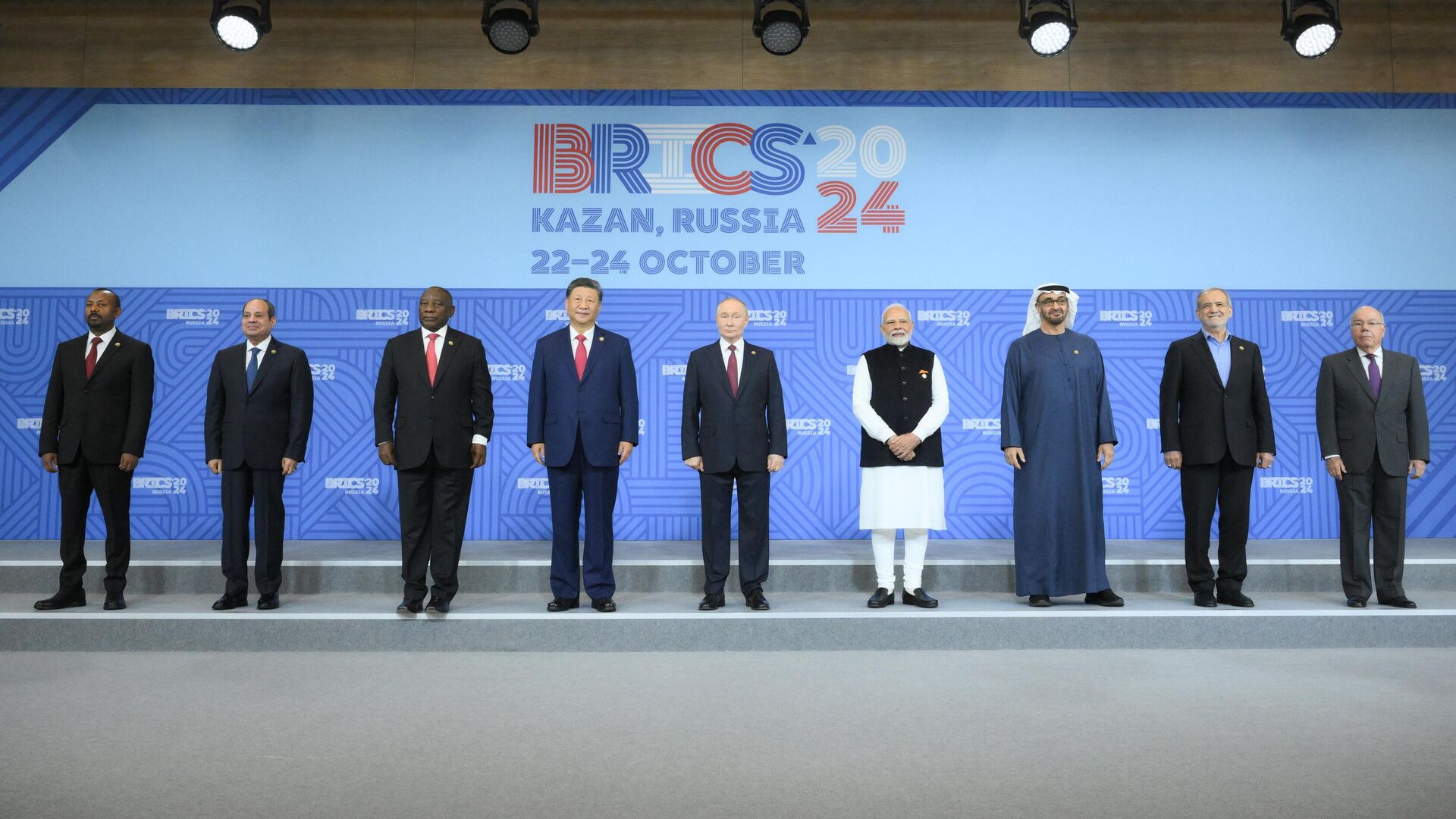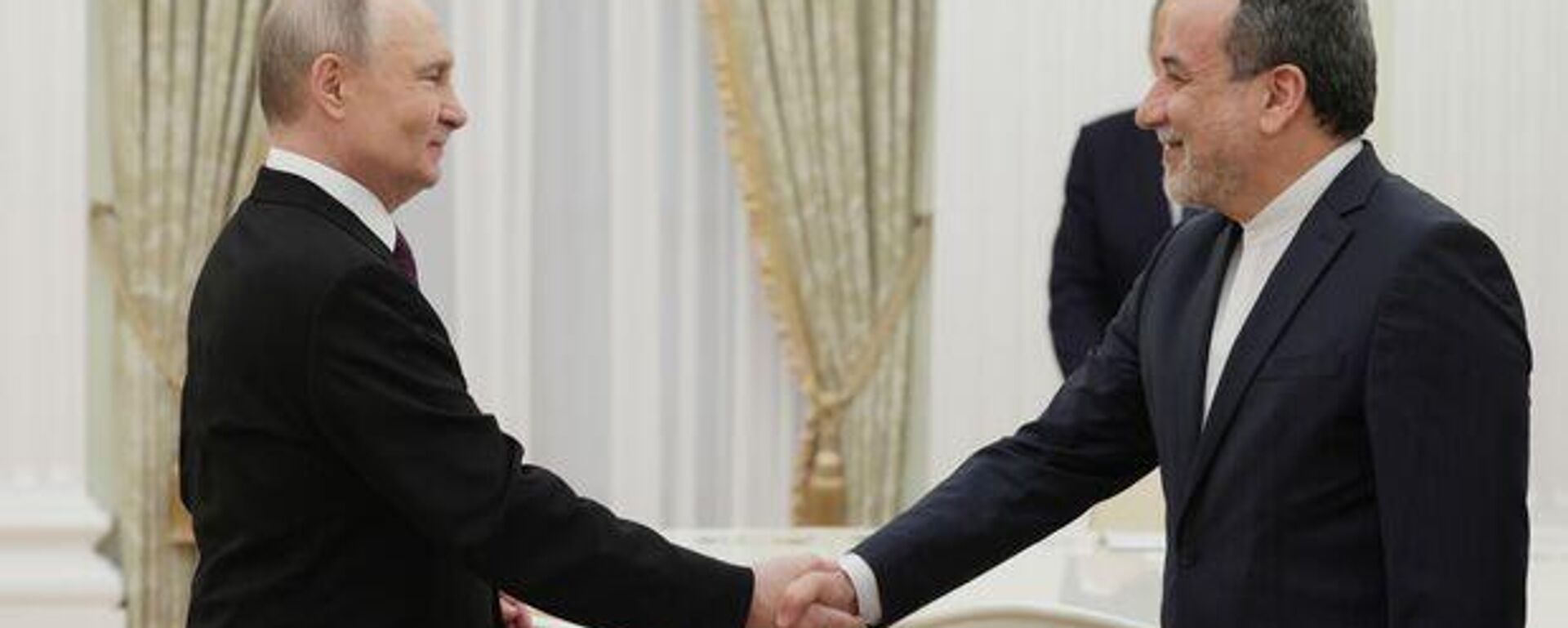https://sputniknews.in/20250625/us-not-worlds-big-brother---bjp-politician-backs-brics-stance-on-mideast-9354712.html
US Not World's 'Big Brother' - BJP-Politician Backs BRICS Stance on Mideast
US Not World's 'Big Brother' - BJP-Politician Backs BRICS Stance on Mideast
Sputnik India
The BRICS nations have expressed "grave concerns" over the US strikes on Iranian nuclear sites. At the same time, the grouping has called for a Middle-East region which is "free of nuclear weapons".
2025-06-25T20:43+0530
2025-06-25T20:43+0530
2025-06-26T12:20+0530
sputnik opinion
donald trump
us
iran
india
bharatiya janata party (bjp)
shanghai cooperation organisation (sco)
brics
nuclear weapons
us deep state
https://cdn1.img.sputniknews.in/img/07e8/0a/17/8312538_0:172:3327:2043_1920x0_80_0_0_d651780774fc9617c90465e45897fd16.jpg
The BRICS Joint Statement on Iran-Israel Conflict is indeed an important message to both the US and Israel, former Indian Ambassador Talmiz Ahmad told Sputnik India."It shows the solidarity of the BRICS movement, which today comprises a very large number of members from West Asia and from Africa," said Ahmad, who has served as Indian envoy to Saudi Arabia, Oman and the United Arab Emirates (UAE).Ahmed said that BRICS' criticism of the American strikes was "very valid".The ex-Ambassador accused Israel of "blatant hypocrisy" in possessing nuclear weapons without ratifying the Nuclear Non-Proliferation (NPT) Treaty, while opposing the "peaceful nuclear programmes" of other countries in the region.Commenting on the growing prominence of the 11-nation BRICS grouping, Ahmad described it as a robust informal grouping standing up against "imperial mechanisms" such as G7 and the North Atlantic Treaty Organisation (NATO).Despite BRICS being a young alliance of nations with limited experience in working together—unlike the Western bloc, which benefits from decades of formalized alliances — 'every BRICS state shares a common aspiration for a multipolar world order', Ahmad said.He stressed that Trump was seeking to strengthen the US hegemony, adding that the attack on the three Iranian nuclear sites was conceived on a false pretext."The US attack on Iran has nothing to do with concerns over a nuclear programme. It has more to do with the fact that Iran remains the only country in the region to not accept US hegemony and having firmly rejected it. That's what annoys Trump," the ex-envoy said.Explaining India's position on the Iran-Israel conflict and the US strikes, Ahmad said that as a large nation with a strong economy, capable military, and broad regional interests, India faces complex challenges—many rooted in colonial legacies, particularly with Pakistan and China.Ahmad emphasised India’s strong commitment to a multipolar world and broad alignment with the Global South’s call for equality in international affairs. At the same time, he noted that some of India’s positions at the United Nations and platforms like the Shanghai Cooperation Organisation may occasionally reflect its national interests over collective positions.To a degree, Ahmad's views are echoed by Savio Rodrigues, a politician from India's ruling Bharatiya Janata Party (BJP), whose supporters are known to be more sympathetic towards Israel.He said that the US strikes on Iran were "certainly wrong and not required", adding that the issue was between Iran and Israel.Further, the Indian politician accused Trump of was first "provoking wars and then claiming to solve them."Further, he questioned the American double-standards on not "allowing" Iran to enrich uranium even for peaceful purposes."Going back in history, the US is the only country in the world to have used nuclear weapons, which was during the Second World War. If we go by Trump's logic that Iran can't have a nuclear weapon, then even the US shouldn't possess a nuclear weapon. Who gave the US authority to strike Iran on mere suspicion of having a nuclear programme capable of potentially producing a nuclear weapon? Iran didn't provoke America. On the other hand, it was involved in direct talks on its nuclear programme in Oman," Rodrigues said.Veteran Ambassador KP Fabian, India's former envoy to UN organisations, told Sputnik India that the BRICS Joint Statement was "significant" as it made a specific reference to Iran's "peaceful nuclear activities". Further, the ex-diplomat asserted that the BRICS grouping remained a key foreign policy challenge for the US.
https://sputniknews.in/20250623/putin-meets-irans-fm-araghchi-in-the-kremlin-9340977.html
us
iran
india
israel
gaza strip
middle east
south asia
Sputnik India
feedback.hindi@sputniknews.com
+74956456601
MIA „Rossiya Segodnya“
2025
Dhairya Maheshwari
https://cdn1.img.sputniknews.in/img/07e6/0c/13/138962_0:0:641:640_100x100_80_0_0_2cb44360dbcdf6d84bf4b299cd045917.jpg
Dhairya Maheshwari
https://cdn1.img.sputniknews.in/img/07e6/0c/13/138962_0:0:641:640_100x100_80_0_0_2cb44360dbcdf6d84bf4b299cd045917.jpg
News
en_IN
Sputnik India
feedback.hindi@sputniknews.com
+74956456601
MIA „Rossiya Segodnya“
Sputnik India
feedback.hindi@sputniknews.com
+74956456601
MIA „Rossiya Segodnya“
Dhairya Maheshwari
https://cdn1.img.sputniknews.in/img/07e6/0c/13/138962_0:0:641:640_100x100_80_0_0_2cb44360dbcdf6d84bf4b299cd045917.jpg
brics trump, brics on iran-israel conflict, brics joint statement, brics summit, trump on iran, us strikes on iran, iran-israel ceasefire, trump on israel, brics multipolar world order, 12 day war
brics trump, brics on iran-israel conflict, brics joint statement, brics summit, trump on iran, us strikes on iran, iran-israel ceasefire, trump on israel, brics multipolar world order, 12 day war
US Not World's 'Big Brother' - BJP-Politician Backs BRICS Stance on Mideast
20:43 25.06.2025 (Updated: 12:20 26.06.2025) The BRICS nations have expressed "grave concerns" over the US strikes on Iranian nuclear sites. The grouping has called for a Middle-East region which is "free of nuclear weapons".
The BRICS Joint Statement on Iran-Israel Conflict is indeed an important message to both the US and Israel, former Indian Ambassador Talmiz Ahmad told Sputnik India.
"It shows the solidarity of the BRICS movement, which today comprises a very large number of members from West Asia and from Africa," said Ahmad, who has served as Indian envoy to Saudi Arabia, Oman and the United Arab Emirates (UAE).
Ahmed said that
BRICS' criticism of the American strikes was "very valid".
"There was no reason whatsoever for the US to intervene in the conflict, which was started by Israel on a pretext questioned even by US intelligence and the International Atomic Energy Agency (IAEA). It was clearly meant to derail the direct US-Iran nuclear talks in Oman. It is plainly a consequence of US President Donald Trump's decision during his first term to withdraw from the UNSC-ratified Joint Comprehensive Plan of Action (JCPOA) that Israel became so emboldened so as to attack Iran directly," the former diplomat underscored.
The ex-Ambassador accused Israel of "blatant hypocrisy" in possessing nuclear weapons without ratifying the Nuclear Non-Proliferation (NPT) Treaty, while opposing the "peaceful nuclear programmes" of other countries in the region.
"The BRICS states have called out this contradiction and Israeli hypocrisy, while demanding that all countries in the Middle-East should be subjected to the same law. So, this BRICS statement is not only directed at the US, but also clearly at Israel," the former diplomat commented.
Commenting on the growing prominence of the 11-nation BRICS grouping, Ahmad described it as a robust informal grouping standing up against "imperial mechanisms" such as G7 and the North Atlantic Treaty Organisation (NATO).
"BRICS is an alternative platform bringing together largely countries that are opposed to American hegemony and are looking for a new world order, that's rooted in multipolarity and respect for international norms," he stated.
Despite BRICS being a young alliance of nations with limited experience in working together—unlike the Western bloc, which benefits from decades of formalized alliances — 'every BRICS state shares a common aspiration for a
multipolar world order', Ahmad said.
He stressed that Trump was seeking to strengthen the US hegemony, adding that the attack on the three Iranian nuclear sites was conceived on a false pretext.
"The US attack on Iran has nothing to do with concerns over a nuclear programme. It has more to do with the fact that Iran remains the only country in the region to not accept US hegemony and having firmly rejected it. That's what annoys Trump," the ex-envoy said.
"In spite of all the contradictions, what binds BRICS nations together is the desire to seek an end to the US or western hegemony and aspiration of a multipolar world order. It is an issue of core importance to every BRICS country, including India," he added.
Explaining India's position on the Iran-Israel conflict and the US strikes, Ahmad said that as a large nation with a strong economy, capable military, and broad regional interests, India faces complex challenges—many rooted in colonial legacies, particularly with Pakistan and China.
Ahmad emphasised India’s strong commitment to a multipolar world and broad alignment with the Global South’s call for equality in international affairs. At the same time, he noted that some of India’s positions at the United Nations and platforms like the Shanghai Cooperation Organisation may occasionally reflect its national interests over collective positions.
"However, largely we remain supportive of the Global South viewpoint about equality in international relations," the ex-diplomat asserted. "Despite repeated attempts by western powers to seduce India into its camp, there is no way that India would become subservient to western interests."
To a degree, Ahmad's views are echoed by Savio Rodrigues, a politician from India's ruling Bharatiya Janata Party (BJP), whose supporters are known to be more sympathetic towards Israel.
"I personally think that BRICS has done the right thing in issuing the statement that they have done. More importantly, the US should understand that it is not the 'Big Brother' of the world," the Indian politician remarked.
He said that the US strikes on Iran were "certainly wrong and not required", adding that the issue was between Iran and Israel.
"What Trump did in his egotistical madness to win a Nobel Peace Prize could have triggered far greater repercussions for the global community, but more so for the region, if things had gone wrong. Abandoning the path of dialogue and diplomacy, especially when countries have or are believed to have nuclear capabilities, is really dangerous," the BJP functionary said.
Further, the Indian politician accused Trump of was first "provoking wars and then claiming to solve them."
"Whether Iran has or doesn't have nuclear weapons is a question one could debate on, Trump's decision to strike the nuclear facilities is a dangerous escalation which could have gone either way," he said.
Further, he questioned the American double-standards on not "allowing" Iran to enrich uranium even for peaceful purposes.
"Going back in history, the US is the only country in the world to have used nuclear weapons, which was during the Second World War. If we go by Trump's logic that Iran can't have a nuclear weapon, then even the US shouldn't possess a nuclear weapon. Who gave the US authority to strike Iran on mere suspicion of having a nuclear programme capable of potentially producing a nuclear weapon? Iran didn't provoke America. On the other hand, it was involved in direct talks on its nuclear programme in Oman," Rodrigues said.
Veteran Ambassador KP Fabian, India's former envoy to UN organisations, told Sputnik India that the BRICS Joint Statement was "significant" as it made a specific reference to Iran's "peaceful nuclear activities".
"It is intended to draw attention to Israel's undeclared nuclear arsenal built up by technical assistance from France since the late 1950s, initially without Washington's knowledge," Fabian commented.
Further, the ex-diplomat asserted that the BRICS grouping remained a key foreign policy challenge for the US.



